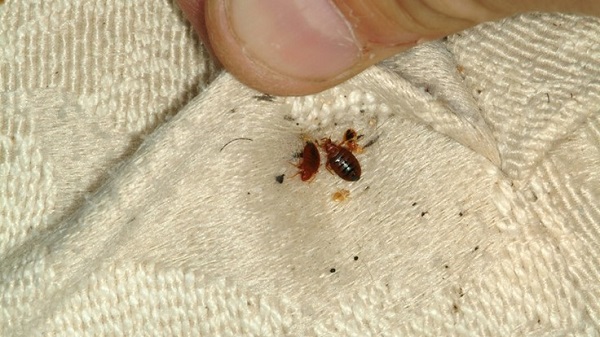Bed Bug Exterminator Houston Services: Premier Extermination Solutions
Bed Bug Exterminator Houston Services: Premier Extermination Solutions
Blog Article
Effective Parasite Control Measures to Safeguard Your Garden and Plants
In the realm of gardening, the consistency of a well-tended yard can often be disrupted by undesirable bugs that endanger the health and wellness and vitality of plants. As gardeners aim to keep a prospering outside area, the difficulty of insect control arises as an essential aspect of their horticultural ventures. Executing efficient pest control determines not just safeguards the yard's visual allure but likewise plays a crucial role in preserving the plants' well-being. By discovering a variety of approaches that include natural repellents, advantageous pests, buddy planting, do it yourself solutions, and environmentally-friendly chemicals, garden enthusiasts can navigate the detailed globe of insect management with accuracy and treatment.
Natural Insect Repellents

Another reliable all-natural parasite repellent is diatomaceous earth, a grainy substance made from fossilized marine microorganisms. Diatomaceous earth works by literally damaging pests with its abrasive texture, making it an outstanding alternative for regulating bugs like slugs, beetles, and caterpillars. In addition, planting friend plants like marigolds, lavender, or basil can aid ward off insects because of their solid scents or natural chemical compounds.
Beneficial Insects for Bug Control

One more beneficial pest is the parasitic wasp, which lays its eggs inside parasite bugs, at some point killing them. Ground beetles are superb for controlling caterpillars, snails, and slugs. Hoverflies, commonly mistaken for bees as a result of their comparable look, eat aphids, thrips, and caterpillars.
To bring in useful insects to your garden, you can plant a diverse variety of blooming plants, such as dill, fennel, and yarrow, which offer nectar and plant pollen for adult bugs. Additionally, avoid using broad-spectrum chemicals that can damage both dangerous and useful insects. By creating a welcoming setting for these helpful insects, you can lower the need for chemical pesticides and advertise a healthier, much more well balanced yard ecosystem.
Friend Planting Strategies
When aiming to websites improve the performance of helpful insects in your garden for all-natural pest control, thinking about companion growing methods can further maximize the environment balance. Buddy planting entails strategically placing specific plants beside each other to optimize their mutual advantages, such as hindering parasites, drawing in useful bugs, or improving vitamins and mineral uptake - bed bug exterminator houston near me. One popular example is planting marigolds together with tomatoes to push back nematodes and other hazardous pests while additionally drawing in pollinators
Planting catch plants like nasturtiums can draw away parasites away from your main plants, serving as sacrificial plants that protect your important produce. By executing buddy planting approaches, you can develop a diverse and harmonious yard ecological community that normally controls insects while promoting plant wellness and productivity.
Do It Yourself Bug Control Solutions
To efficiently manage parasites in your yard, implementing do-it-yourself insect control solutions can be a cost-efficient and eco friendly technique. One usual DIY parasite control solution is creating home made insecticidal soaps by mixing moderate soap with water to manage soft-bodied pests like aphids, termites, and whiteflies. Additionally, introducing helpful insects such as ladybugs, lacewings, and predatory wasps can aid naturally control pest populaces in your yard. Establishing up physical obstacles like row covers or netting can also stop bugs like caterpillars from harming your plants.
An additional effective technique is making use of diatomaceous planet, a natural powder that can be sprinkled around plants to prevent slugs, snails, and other crawling pests. Companion growing specific herbs and blossoms like marigolds, basil, and lavender can help push back parasites and attract beneficial bugs. Regularly inspecting your plants for signs of pest damages and immediately eliminating any affected locations can likewise avoid infestations from spreading. By including these do it yourself bug control services into your horticulture routine, you can secure your garden and plants without depending on extreme chemicals.
Environmentally-Friendly Pesticides

Another efficient alternative is diatomaceous earth, a natural material made from fossilized marine microorganisms, which can be sprayed around plants to manage slugs, snails, and other crawling insects. Additionally, insecticidal soaps and oils originated from plant-based sources work for regulating soft-bodied insects like aphids, mites, and whiteflies.
Final Thought
In final thought, reliable insect control steps such as natural repellents, useful pests, companion planting approaches, do it yourself remedies, and environmentally-friendly chemicals are critical for shielding your yard and plants. By carrying out these methods, you can prevent damage triggered by pests and keep a healthy and successful garden community. It is very important to think about the lasting impact of using chemicals and choose more lasting and green continue reading this options to make sure the health and health of your plants and the atmosphere.
Report this page